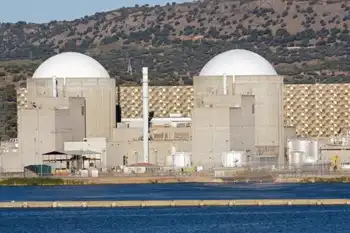CEO of Bend, Ore.-area forest-products firm plans to build biomass power plant
But Potts, 60, chief executive officer of the company, has worked in the industry more than 30 years. Three years ago he earned his master's of business administration online from Marylhurst University.
When asked what he could have learned in a class that he had not already mastered in the business world, Potts said, "It was just always something I wanted to do, and it's good to stay fresh and keep up with the young people."
Potts' survival-of-the-fittest drive seems well suited to his plan to create a $30-million biomass power plant that would burn wood waste inside a boiler to create steam and generate 20 megawatts of electricity per hour.
The plant at the sawmill in Warm Springs would create about 60 jobs. And by burning small trees that serve as fuel to turn forest fires into massive blazes, the plant would reduce air pollution from wildfires and prescribed burns; cut global warming gases, and help Oregon reach its goal of reducing dependence on fossil fuels, according to the company.
The plant could also burn wood waste from orchards and construction projects that would otherwise be burned in an open field or dumped in a landfill.
But the project faces several obstacles. Potts said he is working toward closing an agreement between the Warm Springs tribes and the U.S. Forest Service and the Bureau of Land Management for a 10-year supply of small trees thinned from 10,000 acres per year from the Mount Hood, Ochoco and Deschutes national forests and other federal land.
"It sounds like a big number; they need to treat 100,000 acres per year for hazardous fuels, so it's only 10 percent of what the Forest Service needs (cleared)," Potts said.
The plant would rely on "hazardous fuels," small trees that stoke forest fires, for half of its fuel. The rest would be bark, sawdust and shavings from the sawmill, Potts said.
Potts also needs to secure a consumer market for the energy.
Currently, however, the Oregon Public Utilities Commission requires utilities to provide energy at the lowest possible cost. Biomass energy, however, costs more than the current wholesale rate of electricity, Potts said.
Proposed legislation allowing utilities to buy biomass energy at the higher rate has met opposition in the state Senate from the Industrial Customers of Northwest Utilities, the Citizens Utility Board and Associated Oregon Industries.
"They are worrying about rates going up," said Scott Bolton, government affairs representative for PacifiCorp, which operates as Pacific Power in Oregon. The company's long-range planning includes buying renewable resources including biomass, he said.
The number of consumers who choose to pay more for energy from renewable sources such as solar and wind power through Pacific Power's renewable power programs increased by about 30 percent this year, according to PacifiCorp.
PacifCorp buys its renewable energy from 3 Phases Energy Services.
Collin Whitehead, senior manager of 3 Phases' partnership with the utility, said 3 Phases is interested in buying the Warm Springs biomass energy.
"We're always looking for more biomass, particularly in the service territory," he said. "Those are the things we look for to contribute to (PacifiCorp's) Blue Sky programs."
In the meantime, Potts said he's still pursuing ways to make the biomass energy more competitively priced. The prevailing market price is 5.2 cents-per-kilowatt hour, Potts said. New biomass energy plants produce electricity at 6 cents to 9 cents-per-kilowatt hour. He estimates that the Warm Springs plant would produce electricity at about 7 cents-per-kilowatt hour.
If the company finds a partner, it could qualify for a business energy tax credit that would cover up to 35 percent of the plant's cost, and that would lower the per-kilowatt-hour cost, Potts said.
The company is not eligible for the tax credit because it is owned by the Confederated Tribes of Warm Springs. A partner would be eligible for the credit but could charge a fee for the ability to use its tax credit status, Potts said. But even a 25 percent credit would lower the construction cost by about $7 million.
The forest products company has already begun building a new boiler that fits the strategy for developing a biomass plant because it also creates steam used in the sawmill's lumber-drying process.
The new boiler will be operating by Aug. 1 and will make the sawmill more efficient, require about five fewer workers and reduce accidents related to cleaning the mill's old boiler, Potts said.
About half of the accidents at the mill, such as back strain and eye injury, are related to cleaning the old boiler.
Fewer accidents will cut the company's workmen's compensation costs, Potts said.
Warm Springs is also pursuing federal government low-interest loans for renewable energy development and other low-interest loans, he said.
The niches that Warm Springs is pursuing is a testament to its survival, said Butch Bernhardt, spokesman for the Western Wood Products Association.
"The fact that it's still around is a success in itself," he said.
"The last 10 or 15 years, the lumber industry in the West has been very difficult. Now we're in a time where lumber consumption is at an all-time high. All of our members are taking advantage of that, but it's still a very competitive marketplace with lumber from Canada, Europe and Latin America."
Warm Springs is one of the few western mills that has the Forest Stewardship Council Certification, which is recognized by the Leadership in Energy and Environmental Design (LEED) rating system of environmentally sound residential and commercial building projects, he said.
"That creates a new opportunity or niche to create markets for its products," Bernhardt said. "With a mill like Warm Springs, the source (of timber) is pretty constant from the tribal lands. Other companies must rely on a variety of sources which makes it difficult to get the certification because of the chain of custody being different ownership and management."
Small mills such as Warm Springs must look to niche markets to stay competitive. Big mills have more capital, better timber holdings, more modern manufacturing plants and better access to markets, he said.
"From a strategic standpoint, you have to pencil it out and find other ways to compete," Bernhardt said. "The biggest product may not be lumber. The residuals with biomass or other specialty products can make for a better business."
Related News

Ontario pitches support for electric bills
TORONTO - Applications for the CEAP program for Ontario residential consumers has opened. Residential customers across the province can now apply for funding through their local distribution company/utility.
On June 1st, our government announced a suite of initiatives to support Ontario’s electricity consumers, including a $9 million investment to support low-income Ontarians through the COVID-19 Energy Assistance Program (CEAP). CEAP will provide a one-time payment to Ontarians who are struggling to pay down overdue electricity bills incurred during the COVID-19 outbreak.
These initiatives include:
- $9 million for the COVID-19 Energy Assistance Program (CEAP) to support consumers struggling to pay their energy bills during…





